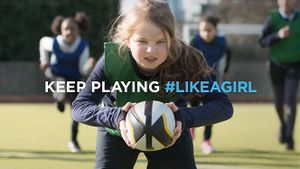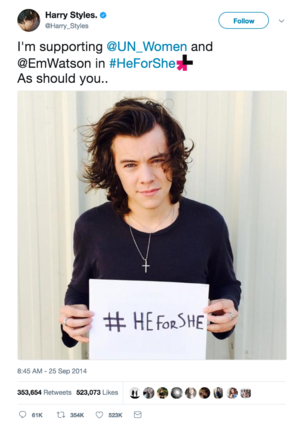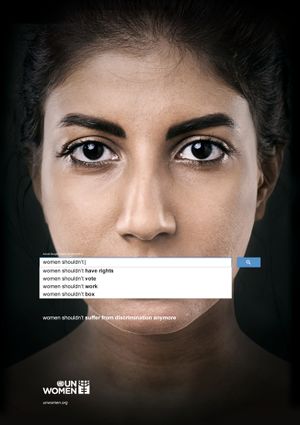Online Feminism in The Digital Age
The Digital Age has largely shaped the feminist movement by bringing about women’s issues and gender equality in a contemporary setting. In the Digital Age, online feminism is largely known as the largest innovation in feminism in the last 50 years that utilizes various platforms on the Internet such as social media to discuss, uplift, and initiate topics such as gender equality and social justice. The impact and results of feminist movement and campaigns are largely measured through statistics on digital media, such as shares, conversations, and events. [1] [2]
Fourth-Wave Feminism
Fourth-wave feminism refers to recent developments in the 21st century that are influencing the feminism movement, especially in technology. Although the boundaries of this term are much debated, fourth-wave feminism is often associated with online feminism, where platforms such as Facebook, Twitter, Instagram, YouTube, and Tumblr are regularly utilized for feminist campaigns. Other online platforms used include petition websites, non-profit organizations, and blogging websites. Many feminist activists argue that the Internet itself is indicative of the continuing influence of the previous waves of feminism, and has created an open “call-out” culture, where sexism and misogyny can be “called out” and challenged. [3] Although the Internet is not the sole factor that defines fourth-wave feminism, it is the greatest vehicle for the fourth-wave that drives discourse and dialogue around feminism, from hashtag activism to digital campaigns that encourage debate and foster real action. Twitter hashtags such as #YesAllWomen and campaigns like The Everyday Sexism Project have allowed “ordinary women to share their stories, organize and find a platform”. [4] [2]
Examples of Fourth-Wave Feminism in Online Digital Campaigns
Always #LikeAGirl Campaign

Always #LikeAGirl was created by the brand of feminine hygiene products, Always . This campaign aimed to show how the impact of the phrase “like a girl” had on society, and used this phrase to transform an offensive message into an empowering one. Always #LikeAGirl has been an inspiration in today's feminist advertising obsession, as it was one of the successful campaigns from corporate companies that went "viral" in the sense that “going viral” was relatively new at the time. In this campaign, Always wanted to drive participation and purpose for their customers, hence using the power of real stories from females to create a conversation with them, and asked women to tweet the things they do #LikeAGirl. The hashtag #LikeAGirl was introduced as their catchphrase for their brand, as “The hashtag was essential in rallying people to change the meaning of “like a girl” by showing the world that it can mean amazing things” said Judy John, CEO of Leo Burnett Worldwide, an advertising agency that partnered up with Always to create this campaign. [5] The center of media coverage in this campaign was the #LikeAGirl videos, which was viewed more than 90 million times on YouTube. Overall, Always #LikeAGirl has attempted to emulate being a brand that breaks stereotypes about females around the globe and changing perceptions of what “like a girl” means. In a study conducted in December 2014 by MSLGROUP, a public relations network specializing in strategic communications, almost 70% of women and 60% of men claimed that "The video changed my perception of the phrase “like a girl”. [6]
GoDaddy and Corporations

For years, GoDaddy has been infamous for having a sexist company culture and airing misogynistic and highly sexualized advertisements on television. Due to online pressure from female consumers, complaints from clients, and feminist organizations such as Miss Representation starting the campaign #notbuyingit to call out sexist brands on Twitter, GoDaddy started to restructure and change their company image and brand. Only recently, GoDaddy has made immense efforts to separate from its sexist past. Examples include getting women into leadership and engineering roles, such as Elissa Murphy being named Chief Technology Officer (CTO). “Return to work” programs at GoDaddy have received positive reviews and feedback in helping getting parents, particularly women , back into the workforce after parental leave. [7] According to GoDaddy CEO Blake Irving in an interview with Fortune Magazine, by May 2015, “40% of GoDaddy’s new college hires, 40% of its interns, 33% of its leadership team, and 18% of its overall engineering and technology roles were filled by women”. Other large corporations, such as Lululemon, Reebok, and Facebook have also been forced to take action, as feminist campaigns have garnered real change through support on the Internet. [8]
HeforShe

HeForShe, piloted by UN Women, is a feminist movement that aims for both men and women to be equal. [9] The campaign has been particularly successful with registering well with the younger demographic, as actor Emma Watson was the primary spokesperson and face of the movement. Social media and the Internet was integral in getting the word out about the HeForShe campaign and reaching out to diverse audiences around the globe, as Emma Watson posted a video of her speech about the launch of the campaign online. The focus on marketing combining social media and hashtag activism also prompted many celebrities and politicians to post #HeForShe on various online platforms, specifically Twitter. [10] “Social media really drove it,” said Jen Risi, CCO of Ogilvy & Mather, the media relations firm that publicised HeForShe. Risi discussed how social media in today’s digital age is a big indicator of how interested and engaged people are with these topics relating to feminism. It allowed for better data collection over the past 15 years, enabling digital campaigns to authentically measure progress and see where there are gaps that still need closing, as Risi added how HeForShe had “absolutely NO promoted tweets, NO promoted Facebook posts, NO ads. ALL organic, viral momentum.” According to Ogilvy & Mather, “HeForShe saw an 82 percent increase in Twitter followers within 24 hours of the Saturday launch, a 305 percent increase in Facebook likes, and a 3,500 percent increase in Instagram followers”. [11]
UN Women: The Autocomplete Truth Digital Campaign

UN Women, also known as The United Nations Entity for Gender Equality and the Empowerment of Women, was formed by the United Nations in 2010 for the sole purpose of empowering women around the world and showing that prejudice and discrimination against women are still rampant. Although the online world has been used by many feminists to produce change, The UN Women: The Autocomplete Truth Digital Campaign shows how there are still widespread stereotypes about women, evident through the most popular results of Google searches. Utilizing the digital world, the adverts from this campaign uses genuine Google searches from various locations around the world to educate audiences about how gender inequality is still a issue in all parts of the world, and that there is still a strong presence of sexism and discrimination against women. These authentic Google searches were conducted on March 9, 2013. [12] Four women were photographed for the digital adverts, with each woman representing a different area of the world, to demonstrate that the problem is global, and that there is still a long way to go to achieve gender equality. The UN Women: The Autocomplete Truth Digital Campaign ultimately had 1.2 billion impressions and 24 million Twitter mentions, apart from the headlines in various news outlets such as CNN, BBC, and Time. [13]
Criticism
Many feminists are concerned about corporations commercializing and taking advantage of female empowerment in order to sell products. Feminist activists argue that large brands are starting to take advantage of feminism and use it as a selling point for marketing campaigns, hoping that consumers will associate female empowerment with them and consumers will think well of their brand, hence purchasing more of their products. [14] As a result, brands and companies who are trying to make money out of feminism could “water down their efforts”, and becomes less about the actual issues, which creates less of a tie to action for feminism. “Most companies tend not to invest in feminist programs, they just tend to use feminist rhetoric to try to get us to spend our money,” says Jennifer Pozner, founder and executive director of Women in Media and News, a media analysis, education and advocacy group. [15]
Progress
As the Internet has emerged as an increasingly important space for feminist activists, it has facilitated the creation of a global community ready for action. The Digital Age has allowed feminism to make a bigger impact, “call people out”, and educate a larger audience about gender inequality. Various tools on the Internet allow for anyone to make their voice heard a lot easier than in previous waves of feminism and is used by many female activists to reach larger audiences. [2] Although there is still a lot to accomplish to reach gender equality, online feminism in the Digital Age has helped advance the feminist movement to more people and allow for more voices to be heard. [14]
References
- ↑ Steer, Emily. Feminism and the Impact of the Digital Age". The Voice Magazine. https://www.voicemag.uk/review/feminism-and-the-impact-of-the-digital-age. Accessed 11 Aug. 2017.
- ↑ 2.0 2.1 2.2 "#FEMFUTURE: Online Revolution". Barnard University. http://bcrw.barnard.edu/wp-content/nfs/reports/NFS8-FemFuture-Online-Revolution-Report.pdf. Accessed 12 Aug. 2017.
- ↑ Feminism: A fourth wave?. Political Studies Association. https://www.psa.ac.uk/insight-plus/feminism-fourth-wave. Accessed 10 Aug. 2017.
- ↑ Chittal, Nisha. How social media is changing the feminist movement". MSNBC. http://www.msnbc.com/msnbc/how-social-media-changing-the-feminist-movement. Accessed 11 Aug. 2017.
- ↑ Case study: Always #LikeAGirl. D&AD. https://www.dandad.org/en/d-ad-always-like-a-girl-campaign-case-study-insights/. Accessed 10 Aug. 2017.
- ↑ Always® Strives to Keep Girls in Sports by Teaming Up with Organizations to Provide Access and Support for Girls Everywhere to Keep Playing #LikeAGirl. Always. http://news.always.com/press-release/always-product-news/always-strives-keep-girls-sports-teaming-organizations-provide-acc. Accessed 11 Aug. 2017.
- ↑ Metz, Cate. “GoDaddy Isn't The Company You Think It Is” Wired. 26 April 2015. https://www.wired.com/2015/05/godaddy-isnt-company-think/. Accessed 10 Aug. 2017
- ↑ McCue, Matt. “A new documentary shows what happens when there aren’t enough women in tech” Fortune Magazine. 24 April 2015. http://fortune.com/2015/04/24/women-tech-documentary/. Accessed 10 Aug. 2017
- ↑ Our Mission. HeForShe. http://www.heforshe.org/en/our-mission. Accessed 11 Aug. 2017.
- ↑ Goulbourne, Kim. “Behind The Hashtag: #HeForShe” The Social Media Monthly. 24 March 2016. http://thesocialmediamonthly.com/behind-the-hashtag-heforshe/. Accessed 12 Aug. 2017
- ↑ Garcia, Tonya. “Ogilvy: Social Media Was Key to the Success of the HeForShe Campaign Launch” Adweek. 25 Sept. 2014. http://www.adweek.com/digital/ogilvy-social-media-was-key-to-the-success-of-the-heforshe-campaign-launch/. Accessed 12 Aug. 2017
- ↑ UN Women ad series reveals widespread sexism. UN Women. http://www.unwomen.org/en/news/stories/2013/10/women-should-ads. Accessed 10 Aug. 2017.
- ↑ Griner, David. “Powerful Ads Use Real Google Searches to Show the Scope of Sexism Worldwide” Adweek, 18 October 2013. http://www.adweek.com/creativity/powerful-ads-use-real-google-searches-show-scope-sexism-worldwide-153235/. Accessed 10 Aug. 2017
- ↑ 14.0 14.1 Fineman, Meredith. “When Not to Use Feminism to Sell Stuff to Women” Harvard Business Review. 01 October 2014. https://hbr.org/2014/10/when-not-to-use-feminism-to-sell-stuff-to-women. Accessed 12 Aug. 2017 Cite error: Invalid
<ref>tag; name "HBR & Feminism" defined multiple times with different content - ↑ Ngabirano, Anne-Marcelle. “Are women being played by 'feminist' ads?” USA Today. 22 March 2017. https://www.usatoday.com/story/money/2017/03/22/have-companies-taken-over-feminism/98706852/. Accessed 10 Aug. 2017